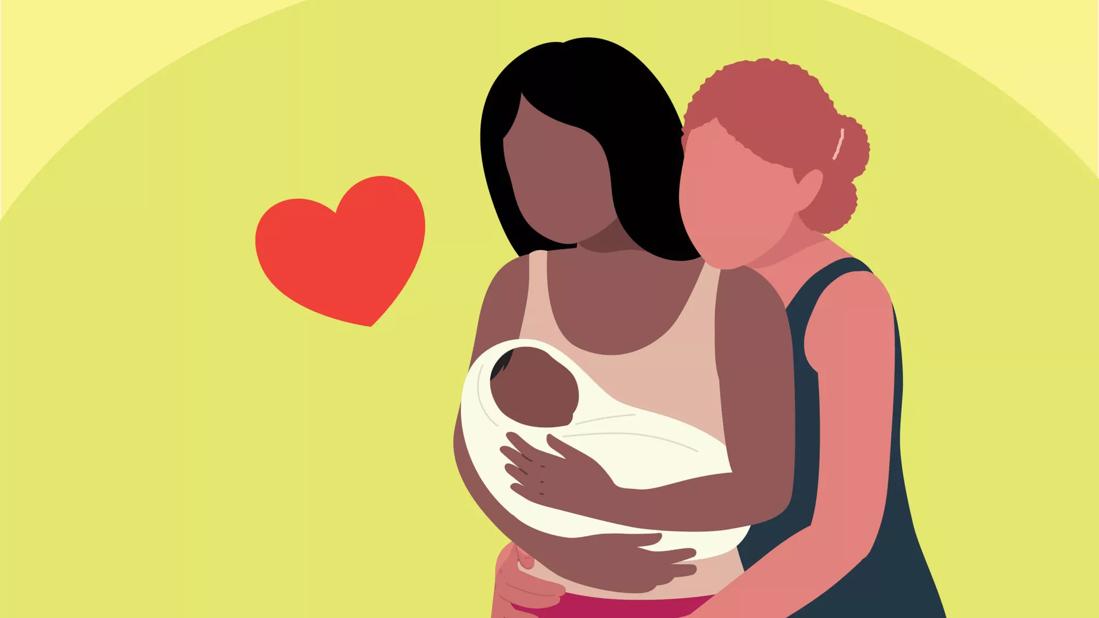Having a baby after a loss can bring unexpected emotions

Grieving can be a difficult process, especially after you’ve experienced a miscarriage, stillbirth or loss of an infant. Sometimes, parents will have or adopt children after experiencing such a loss, and those children are often referred to as “rainbow babies.” This term is meant to refer to something beautiful after a dark time — a rainbow after the storm.
Advertisement
Cleveland Clinic is a non-profit academic medical center. Advertising on our site helps support our mission. We do not endorse non-Cleveland Clinic products or services. Policy
Ob/Gyn and high-risk pregnancy specialist Adina Kern-Goldberger, MD, discusses what you might expect when you’re expecting a rainbow baby and all the potential joy and challenges that come with that experience.
If you’re pregnant or adopting a child after experiencing a loss, you’ve probably heard people refer to them as your “rainbow baby.” Many parents find comfort in the phrase, which has gained popularity on social media and pregnancy websites. But if the term doesn’t speak to you, you don’t have to feel pressured to use it. Your feelings are valid no matter how you choose to communicate with others about the loss you’ve experienced or your children in general.
“Not everyone wants to see their living child as a ‘rainbow,’ or the child they lost as a ‘storm,’” recognizes Dr. Kern-Goldberger. “Some parents don’t want to define their child based on a loss. It’s an emotionally charged topic and there’s no right answer for everyone. The term is meant to be helpful to those who connect with it, but disregard it if it causes stress or grief.”
A happy event, like becoming pregnant or adopting a child after a loss, can bring powerful, simultaneous waves of joy and sorrow. Feeling these two opposites at the same time can sometimes be confusing and overwhelming.
Advertisement
And sometimes, new mental health challenges arise like stress, anxiety and depression. If you’re experiencing any of these issues, talk to your healthcare provider.
“Be open with your healthcare provider about how you’re feeling,” encourages Dr. Kern-Goldberger. “We’re here to support you emotionally, not just physically. Many resources are available to provide support after a miscarriage or infant loss. You’re not alone, and you don’t have to deal with this challenge alone.”
Experiences like these are so nuanced that it’s important to make space for your needs, allow yourself to feel however you’re feeling and take this journey one step at a time.
Dealing with a rollercoaster of emotions is enough to navigate when you’re expecting — or trying for — a rainbow baby. Unfortunately, you may also have to cope with less-than-helpful comments from people in your life.
“The media portrays pregnancy as a guarantee, like losing a baby never happens,” notes Dr. Kern-Goldberger. “This popular view of pregnancy makes it even harder for parents who experience a loss. Others don’t understand what they’re going through, and may be shocked to hear about a miscarriage or stillbirth. Then, people say things that can be deeply hurtful to the parents.”
As much as you can, try not to let toxic comments or negative people affect your mental space. In many cases, the person may be trying to be helpful, but simply doesn’t know the right things to say. If you’re comfortable doing so, you could tell them why their comment was upsetting and what they could say instead. Or you could work with a therapist for more fitting coping strategies. But under no circumstances should you let another person’s negativity influence you.
If you’ve experienced a loss and you’re thinking about trying to get pregnant again, a few small steps could have a big impact on your physical and mental health as you move forward.
The most important first step is to schedule an appointment with your healthcare provider to talk about your goals and your journey ahead. Sometimes, this journey starts with grief counseling or therapy followed by a preconception appointment.
“A preconception visit is important after a miscarriage, stillbirth or infant loss,” says Dr. Kern-Goldberger. “We can make sure your physical and mental health needs are covered. When we establish care early on, we can follow your pregnancy closely.”
Another small thing you can do is start taking a prenatal vitamin.
Advertisement
“Nutrients like folic acid are essential to have in the early days of pregnancy, before you know you’re pregnant,” says Dr. Kern-Goldberger. “A prenatal vitamin will contain those nutrients in the right proportions for pregnancy.”
It can be hard to know just when you should see a doctor about infertility, especially when you get a negative pregnancy test month after month, while at the same time, grieving for the child you lost.
“It’s normal for it to take several months to achieve pregnancy,” explains Dr. Kern-Goldberger. “Even if you got pregnant quickly before, that may not be the same experience the second time around. It doesn’t mean anything is wrong. Your body just might need more time to heal, or the timing might be a little off.”
You can schedule a visit with your healthcare provider at any time to talk about questions or concerns you have about this process. But if conceiving again is important to you, you’ll especially want to see a healthcare provider if you’re:
“Your healthcare provider can run tests to check for possible causes of infertility,” says Dr. Kern-Goldberger. “If needed, they may refer you to a reproductive endocrinologist or maternal-fetal medicine specialist.”
Advertisement
It's understandable if you want close monitoring during your pregnancy. Will you need extra tests, exams or check-ins to make sure everything is OK?
“The causes of most miscarriages and stillbirths are unknown and are not the parents’ fault,” states Dr. Kern-Goldberger. “Sometimes, the loss is due to genetic abnormalities that won’t happen in the next pregnancy. Still, it’s extremely comforting for parents to keep a close eye on the fetus as it grows and develops.”
She adds that most Ob/Gyn offices accommodate additional checks. In fact, it can be particularly helpful to outline your preferences in your birth plan.
“Medical reassurance is tremendously helpful to many parents,” says Dr. Kern-Goldberger. “Heart rate checks and prenatal visits can go a long way toward relieving anxiety, so don’t be afraid to ask for them.”
Along the way, keep in mind that as you get closer to the timeframe of your previous loss, it can sometimes be an especially difficult time for your mental and emotional health. For this reason, it’s important to check in with yourself and express what you need to help process how you’re feeling.
“If a parent lost their baby at 30 weeks, the time leading up to the 30-week mark may be extra stressful,” notes Dr. Kern-Goldberger. “There is no right or wrong way to cope with that period of time. Some parents appreciate extra monitoring, while others wish to grieve the loss at home or with loved ones.”
Advertisement
If you’re past 20 weeks of pregnancy, you may want to learn how to count the kicks of your developing fetus.
Kick counting isn’t a foolproof way to ensure a perfect pregnancy. But it provides you with some intel about how your little one is doing. The American College of Obstetricians and Gynecologists (ACOG) says you should feel about 10 movements in two hours.
“You have to learn what’s normal,” says Dr. Kern-Goldberger. “All developing fetuses have periods of activity and sleep. Talk with your provider about kick counting and when you should start doing it. Also, ask them when lower levels of activity might be a concern.”
As you approach labor and delivery, the emotions you’ve been feeling may get stronger. Labor and delivery are intense for anyone, and likely, even more so for you.
“Parents who have lost a child often experience a high level of emotions during labor and delivery,” says Dr. Kern-Goldberger. “They have a profound awareness of what can go wrong, coupled with intense joy and hope.”
It’s totally normal to also feel rising levels of anxiety and grief alongside happiness and relief.
“When you feel intense gratitude for your healthy baby, you may also feel your previous loss more deeply,” she continues. “The hormonal changes, excitement and pain of childbirth can send a rush of emotions. Notice what you’re feeling and take time for your own reflection and self-care.”
Getting pregnant again isn’t the only way to have a rainbow baby. Some people choose to adopt after a loss instead. The adoption process is just as meaningful and comes with its own set of emotions and worries.
“Some parents don’t wish to pursue pregnancy after the trauma of losing a child,” says Dr. Kern-Goldberger. “Others choose adoption because they’re unable to get pregnant again. And some families adopt simply because they want to adopt.”
Your rainbow baby journey is uniquely yours no matter what path forward you choose. Families come in all types and sizes, and only you know what’s best for you.
Sometimes, it’s easy to get caught up in the thought that having or adopting a child after a loss will be smooth sailing. But often, the experience can still be just as challenging as it is heart-warming. You may experience physical, emotional and mental difficulties as you develop a relationship with your new child, and that’s OK.
“Caring for any newborn is a difficult job,” says Dr. Kern-Goldberger. “You can be grateful and elated to have a new child, and also drained and stressed. Perfectly healthy babies cry a lot and need 24/7 care. None of this magically goes away with a rainbow baby.”
Exhaustion, stress and concern for your child’s well-being should be expected. But postpartum depression is something that requires treatment.
Signs of postpartum depression include:
If you experience any of these symptoms, talk to your healthcare provider about possible treatments.
A rainbow baby can bring joy to a family that has been affected by a deep, painful loss. And it’s OK — and healthy — to grieve that loss long after your rainbow baby arrives. After all, having another child will never replace the child you lost. But they may just make your world a little brighter and more beautiful.

Sign up for our Health Essentials emails for expert guidance on nutrition, fitness, sleep, skin care and more.
Learn more about our editorial process.
Advertisement

Hot tubs and saunas raise your body temperature and can pose risks

You can’t be pregnant and have a menstrual period, but there are other reasons you could experience bleeding during pregnancy

Sleeping on your back for long stretches may impact circulation as your bump gets bigger — sleeping on your side is safest

The birthing process can take longer than you might expect, and plans can always change

Sympathetic pregnancy is real and can cause nausea, vomiting, weight gain, fatigue and other symptoms

Everyone’s unique, and there’s no exact checklist of symptoms, but you may feel contractions, cramps and pelvic pressure

More radiant skin may appear due to physiological responses to pregnancy

A healthy pregnancy diet includes good amounts of folic acid, DHA, calcium and more

Even small moments of time outdoors can help reduce stress, boost mood and restore a sense of calm

A correct prescription helps your eyes see clearly — but as natural changes occur, you may need stronger or different eyeglasses

Both are medical emergencies, but they are very distinct events with different causes